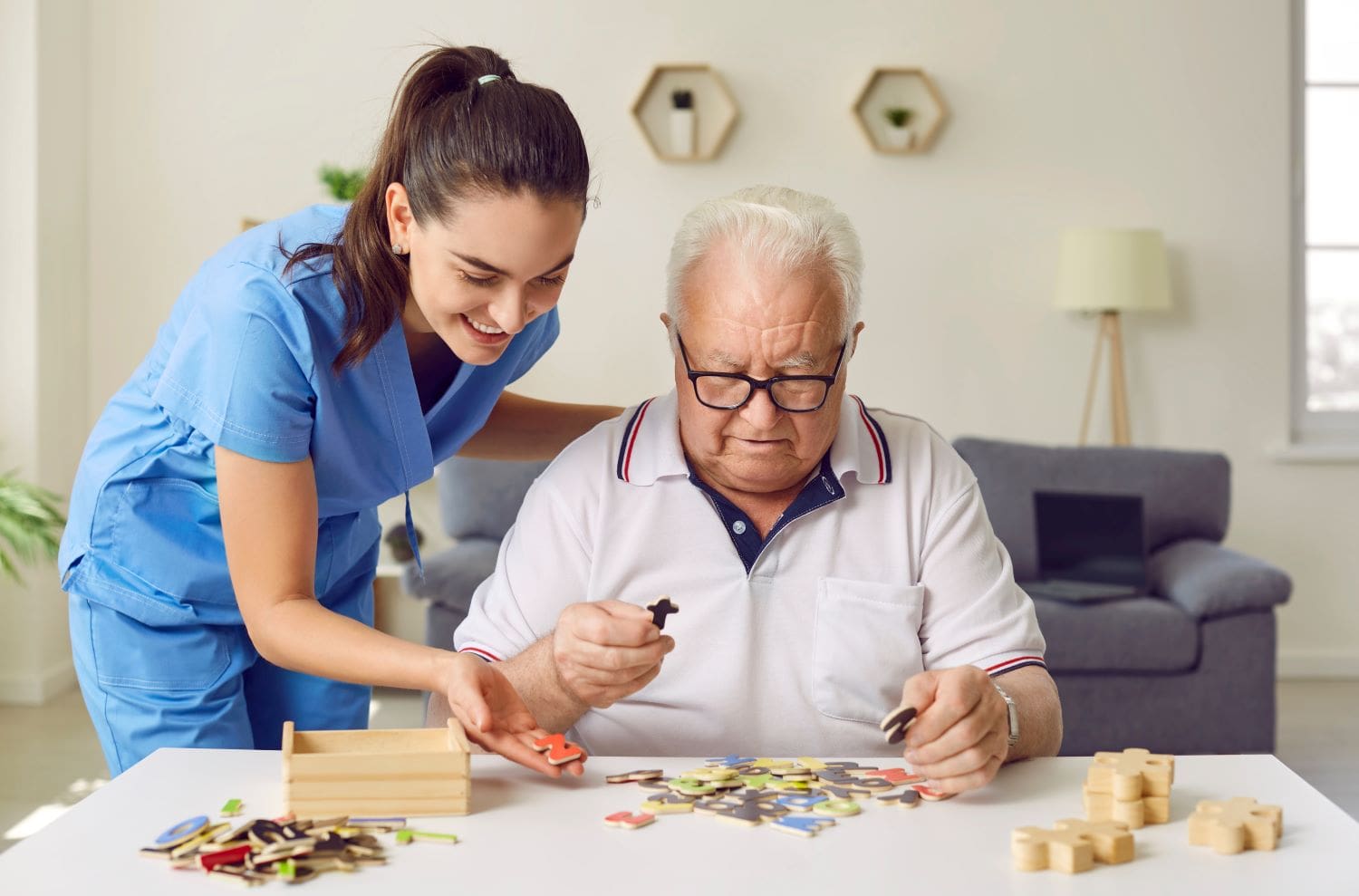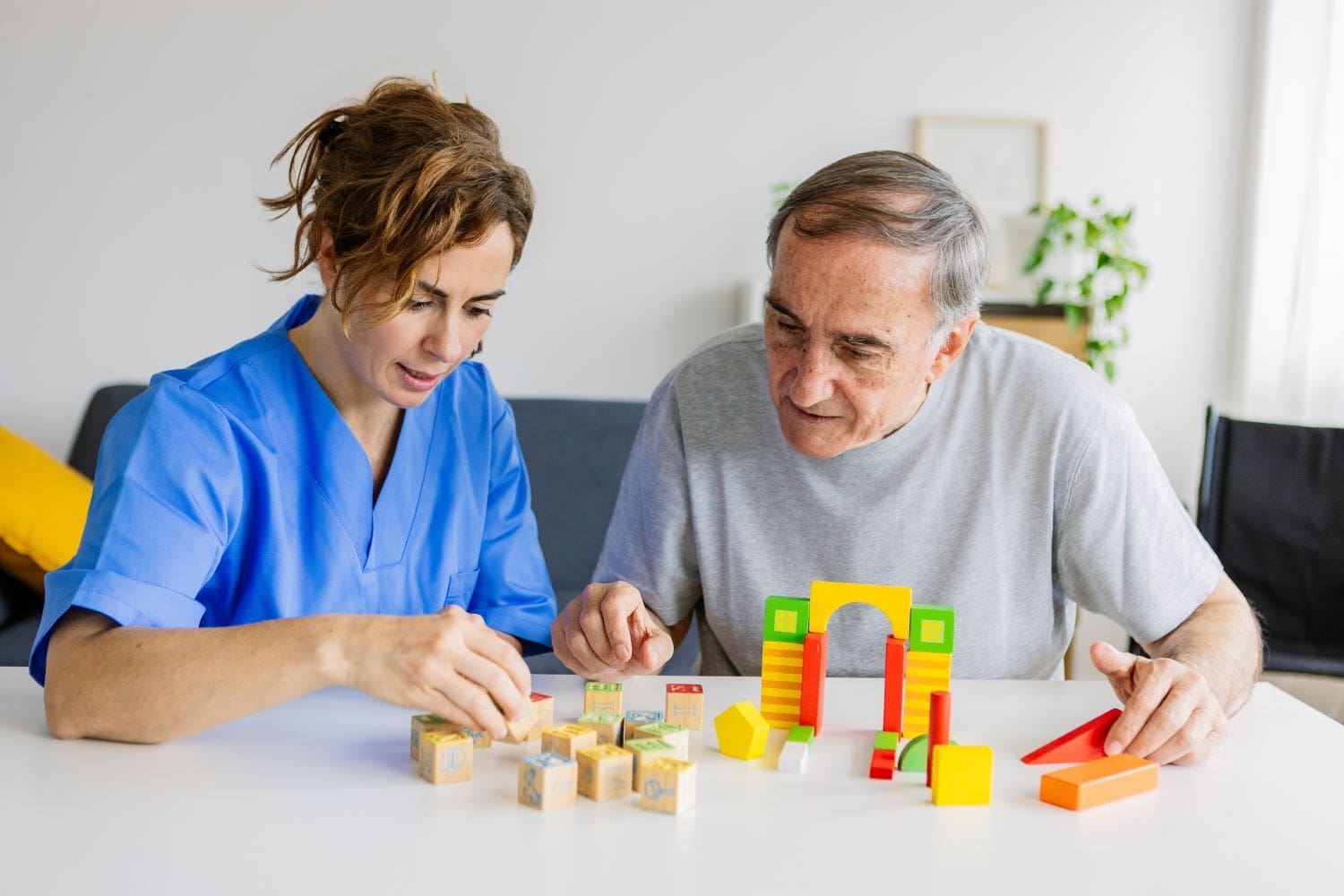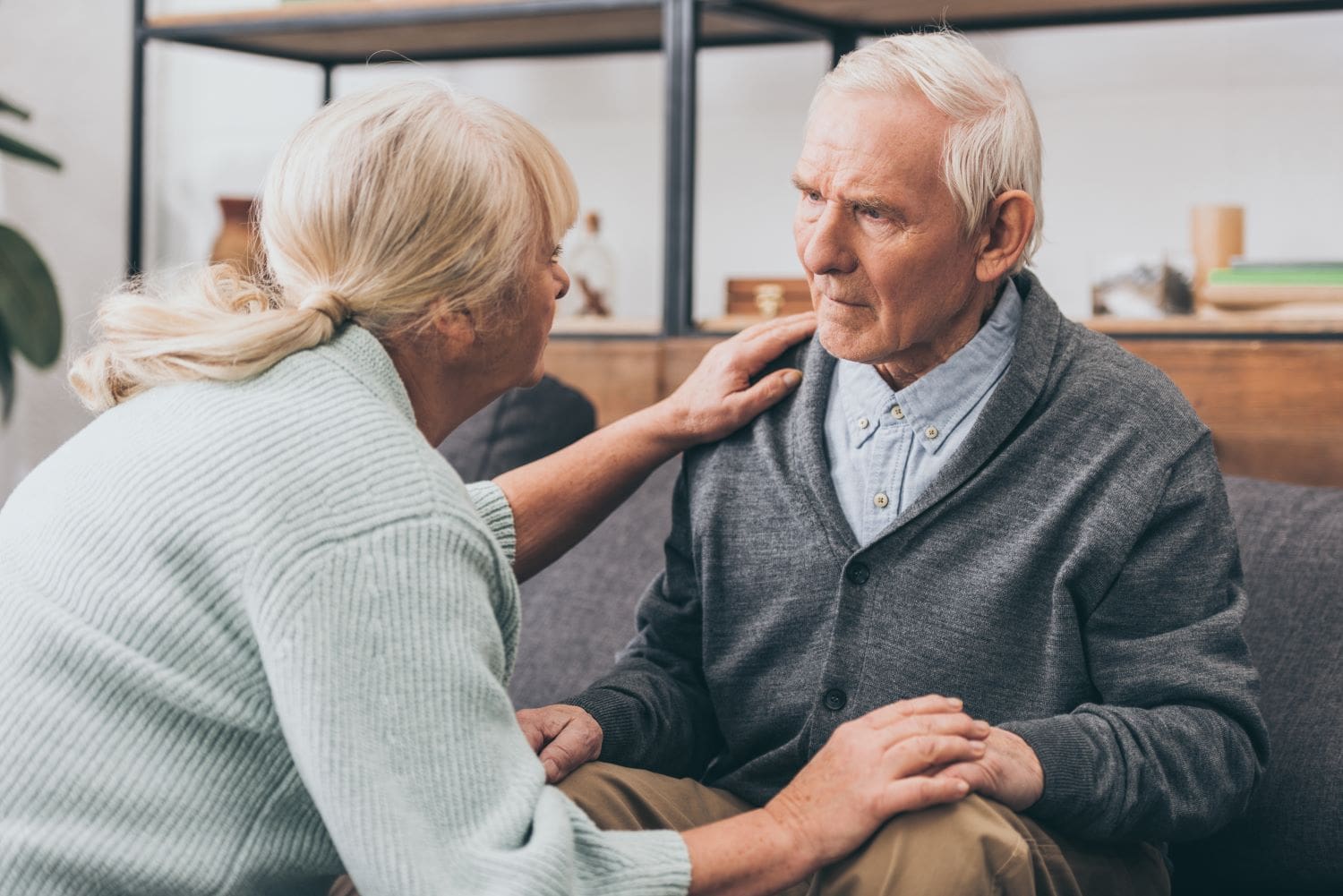In this post
Dementia is a major neurocognitive disorder that affects more than 55 million people worldwide, and there are nearly 10 million new cases annually (World Health Organisation). According to Alzheimer’s Research UK, in 2021, 944,000 people were estimated to be living with dementia in the UK and by 2050 this figure is expected to rise to 1.6 million.
Dementia can significantly impact sufferers and their families, and also communities and society as a whole. Therefore, it is vital to understand more about the condition to reduce risks and manage it. This blog post aims to provide a comprehensive understanding of dementia, its types, symptoms, and the care needs of individuals with dementia.
What is Dementia?
Dementia refers to various progressive conditions affecting the brain. It is not a disease itself and not a natural part of ageing. It describes a particular set of symptoms that can affect:
- Problem-solving.
- Memory.
- Behaviour.
- Language.
The condition is progressive, and symptoms get gradually worse over time. How dementia progresses will depend on numerous factors, such as general health, age and lifestyle. There are risk factors that can increase the likelihood of developing dementia (NHS), which include the following:
- Age – older people, particularly those over 65.
- Existing health conditions – such as obesity, high blood pressure and diabetes.
- Genetics – there is evidence that genes play a role, especially in less common types.
- Air pollution – being exposed to air pollution, as it may affect the brain.
- Unhealthy lifestyle – a lack of physical activity, a poor diet, smoking and drinking too much alcohol.
- Others – untreated depression, hearing loss, lower education levels and loneliness/social isolation may have a role.
It is progressive, as only a part of a person’s brain is damaged in the early stages. Over time, the disease responsible for dementia spreads to other parts of the brain and the areas initially damaged become more affected. Those living with the condition then start to experience worsening symptoms, as the brain cannot function properly.
Dementia can have significant impacts on individuals. When a person receives a diagnosis, they can experience an array of emotions, such as grief, worry, anxiousness, depression, disbelief, frustration, confusion, helplessness and hopelessness. They may also be relieved to know what is causing their symptoms and understand their condition better.
Dementia can have other impacts on individuals, as it can make daily activities difficult, reduce their independence and affect their physical/mental health and overall well-being. They may start to decline cognitively and have difficulties with memory and speech. Family members and caregivers can also experience significant impacts, as their loved ones can exhibit challenging behaviours and need additional care and support. It can be stressful, costly, time-consuming and result in caregiver burnout.
Dementia not only affects sufferers, but it also has societal implications. It costs a great deal to care for people with dementia. According to the Alzheimer’s Society, the total cost of dementia care in the UK is £34.7 billion, predicted to rise to £94.1 billion in 2040. These costs mainly consist of NHS and social care, partially funded by the State and the taxpayer. An increase in people diagnosed with dementia can put a burden on health and social systems, families and caregivers.

Types of Dementia
There are numerous types of dementia and over 200 subtypes (Dementia UK). Some of the most common include Alzheimer’s disease, vascular dementia, mixed dementia, frontotemporal dementia and dementia with Lewy bodies.
Alzheimer’s disease
It is one of the most common types of dementia that mainly appears in people over 65. According to Dementia UK, age is the largest risk factor for developing the disease.
Alzheimer’s disease accounts for more than 60% of diagnoses in the UK, and it is the most common form that also develops in people under 65 years old (young onset dementia) (Dementia UK).
It affects a person’s cognitive function and affects everyone differently, but some common early symptoms include:
- Gradual memory loss, particularly recent memories.
- Forgetfulness, confusion and disorientation.
- Thinking, decision-making and reasoning difficulties.
- Language and communication problems, e.g. difficulty following conversations and finding words.
- Behavioural, personality and mood changes.
- Changes in seeing and hearing things.
Vascular dementia
This is the second most common type of dementia and affects around 20% of the population (CPD Online). It results from reduced blood flow to the brain, e.g. after a stroke, that causes damage. Symptoms may progress gradually or appear suddenly.
Individuals may experience problems with planning, organising, problem-solving, decision-making, sudden memory loss and confusion in the early stages. They may also experience physical issues, such as balance and walking difficulties and mood changes.
Mixed dementia
This type of dementia is where individuals experience a combination of different dementia types, such as Alzheimer’s disease and vascular dementia. According to the Alzheimer’s Society, at least one in every ten people is diagnosed with more than one type of dementia.
It is common in older people, especially those over 75 years old and often results from high blood pressure and damage to the brain’s blood vessels.
The symptoms will depend on the types of dementia and the parts of the brain affected. Common ones can include speech, behaviour and mood changes, memory loss, confusion and struggling with daily tasks.
Frontotemporal dementia
This rare type of dementia affects the brain’s frontal and temporal lobes. Unlike the other types of dementia, it often occurs at a younger age, especially in those under the age of 65 (usually between 45 and 64). According to Dementia UK, it affects approximately one in 20 individuals diagnosed with dementia.
It can lead to significant language, behaviour and personality changes, as it affects the parts of the brain that control speech, emotions, memory, etc. Those with the condition may exhibit language difficulties, inappropriate behaviours, poor judgment, impulsivity and a lack of empathy.
Dementia with Lewy bodies
This type of dementia is less common and is thought to affect 10-15% of those diagnosed (Dementia UK).
It occurs because of abnormal protein deposits (Lewy bodies) in the brain. It can cause various symptoms, such as memory loss, movement/thinking difficulties, fluctuating alertness/concentration, visual hallucinations and sleep disturbances. They may also experience symptoms similar to Parkinson’s disease, such as tremors and stiffness.
It is important to understand that individuals may experience different symptoms, and they can overlap. However, each type does have unique features, so understanding these can help individuals get a quicker and more accurate diagnosis, care and support.

Symptoms of Dementia
The dementia symptoms a person experiences will depend on what part of their brain is damaged. Here are some examples of common signs and symptoms seen in those with dementia:
- Difficulty concentrating.
- Memory loss, e.g. worsening forgetfulness, misplacing things and struggling with names.
- Changes in mood and personality, e.g. mood swings, losing interest in hobbies and irritability.
- Finding familiar daily tasks difficult.
- Confusion about time and places, e.g. getting lost in familiar places or getting up at night for daytime activities.
- Struggling to find the right words.
- Difficulty following conversations.
These symptoms may be prevalent sometime before an individual receives a diagnosis. They can begin mild and get worse gradually over time. Where symptoms are mild, it is often known as ‘mild cognitive impairment’.
The symptoms an individual experiences will also depend on the type of dementia. For example, a person with dementia with Lewy bodies may have visual hallucinations, and another with frontotemporal dementia may have problems with their speech. The stage of dementia will also affect the symptoms exhibited. There are three stages of dementia, which are:
- Early stage – in this stage, individuals may have mild symptoms that are often tricky to spot. They may experience problems with their memory, speed of thought, language or perception.
- Middle stage – in this stage, a person’s symptoms may become more noticeable and require additional support with their daily activities. Their memory, thinking, speech and language may worsen. They may also start to become deluded and paranoid and hallucinate.
- Late stage – in this stage, individuals will typically require full-time care and support and additional help with daily tasks and personal care. Physical issues and altered perception are often more noticeable, there are significant behavioural and mood changes, and they will struggle with memory and language. According to the Alzheimer’s Society, the symptoms of all dementia types become very similar at the late stage.
The NHS has specific symptoms for different types of dementia.
Dementia symptoms can have a significant impact on individuals and their families and caregivers, especially as their condition progresses and symptoms worsen, e.g.:
- Individuals with dementia can experience emotional effects. They may be distant, irritable, overreact and have rapidly changing moods. They may also be unmotivated and show a lack of interest in things, which can be difficult for caregivers. There may also be an increase in challenging behaviours.
- Dementia can be a significant blow to individuals, affecting their confidence and making them feel insecure. They may question their abilities and judgment and feel they are losing control. It can result in social isolation, especially if they are treated differently and have experienced stigma, and may also affect their employment, finances and relationships.
- It can be difficult for those with dementia to communicate and for others to understand them. They may regularly forget things, such as faces, names and events, struggle to find the right words and have problems following conversations. They may lose interest in socialising and become withdrawn, leading to loneliness.
- Jobs and everyday tasks can be difficult for those with dementia, as they can find it difficult to concentrate, e.g. struggling with counting change when shopping and getting confused about time and places.
- Individuals can become restless and try to leave the house or care facility. They may not know where they are and who to contact, compromising their safety. It can be a very worrying time when someone with dementia goes missing. The Herbert Protocol helps to find vulnerable people who go missing. It was named after George Herbert, who went missing from his care home and sadly died while searching for his childhood home.

Understanding Care Needs
All individuals are unique, come from different backgrounds and have various needs, wishes, preferences, beliefs and values. Each person will also experience dementia differently, and their environment, relationships and support will also influence the way they feel (Alzheimer’s Society). Therefore, it is vital to understand the diverse care needs of individuals living with dementia to ensure they are treated with dignity and respect and feel valued and included.
When a person is diagnosed with dementia, they and their families and caregivers should understand their condition and needs so they can:
- Live as independently as possible.
- Be autonomous and involved in decision-making regarding their care and support.
- Be part of the communities in which they live.
- Carry on doing the things they enjoy.
- Have a good quality of life.
- Plan for the future.
An essential aspect of meeting the diverse needs of those with dementia is understanding and providing person-centred care, which is “thinking about what makes each person unique, and doing everything you can to put their needs first” (The Nursing and Midwifery Council). It is important as it:
- Ensures care and support provided to individuals meets their unique needs and promotes well-being.
- Provides individuals and their families and caregivers with essential information to empower them to make informed decisions about their care.
- Encourages individuals and their families and caregivers to focus on what the person still has rather than what they have lost.
- Ensures individuals are treated with compassion, respect and dignity and recognises that there is a person behind their dementia diagnosis.
- Can lead to positive outcomes, as individuals are active partners in their care and have choices that meet their needs and preferences.
Health and social care professionals, families and caregivers must ensure they tailor their approaches to meet the needs of each individual with dementia. They should look at their care and support needs holistically, meaning they see a person as a whole and consider their needs, such as physical, emotional, psychological and spiritual.
- Physical – dementia can cause pain and other physical symptoms, e.g. mobility issues, poor muscle control and a loss of balance. Care may involve pain medication, physiotherapy and complementary therapies.
- Emotional (social) – people with dementia will go through many challenging emotions and may be in emotional distress about their diagnosis and condition, which can also impact those around them. They may also have concerns about their families, employment and finances. Individuals and their families and caregivers may need emotional care and support.
- Psychological (mental) – being diagnosed with dementia and experiencing symptoms can significantly impact a person’s mental health and well-being and their family, caregivers and friends. Care may involve help and support for those experiencing psychological problems relating to diagnoses, symptoms, treatments, and caregiving.
- Spiritual – when someone is diagnosed with dementia or is progressing into the later stages of the condition and end of life, their spiritual needs may change, and they may look for meaning in their life. Care may involve assessing a patient’s spiritual needs and providing appropriate support, e.g. chaplaincy. It can also include spiritual support for family and caregivers.

Caregiving Strategies and Techniques
Regardless of what stage someone is at with their dementia or the type they have, they need to receive good quality care and support, whether in the home environment or care facilities. Here are some practical tips and strategies for caregivers supporting individuals with dementia:
- Understand dementia and individual needs – it will be hard to care for someone with the condition if there is a lack of understanding. Families and caregivers should learn about dementia and its symptoms, stages, effects and challenges. They should also identify the individual’s needs and wishes to provide personalised care.
- Be positive – it can be a confusing and upsetting time for individuals with dementia. Caregivers should be positive, encourage them, offer praise and celebrate successes. Even though it can be frustrating for caregivers, they should be compassionate and patient and avoid criticism and belittling comments. If the person makes mistakes, be supportive and offer positive interactions, such as smiles and hugs.
- Keep them active and engaged – provide opportunities for individuals with dementia to encourage socialisation, prevent social isolation, keep their brain active and give them a sense of purpose. Caregivers could support them to engage in the activities they enjoy, maintain existing social relationships and form new friendships. They could also encourage them to join hobby and activity groups.
- Break down and schedule tasks – caregivers could help those with dementia by breaking down their tasks into smaller steps and providing written and picture instructions. They could also schedule tasks when the person is the most focused and set reminders.
- Use memory aids – difficulties with memory and remembering things are common in most types of dementia. To help with this, carers could try the following memory aids:
- Calendars.
- Journals.
- Diaries.
- Planners.
- Whiteboards.
- Sticky notes.
- Electrical devices/clock alarms.
- Smartphone apps.
- Try assistive technology – there are numerous ways caregivers can use technology to help them support individuals with dementia. The Alzheimer’s Society has further information on this.
- Seek help and support – there are plenty of resources, advice and support groups to help and support those caring for people with dementia, including Admiral Nurses. If families are carers, they should seek a carer’s assessment from their local authority, which helps to identify things that could make it easier. Further information on this is from the NHS.
It can often be difficult for those with dementia to communicate effectively and for caregivers to understand. There are some communication techniques that carers can use, such as:
- Being a good listener.
- Speaking clearly and slowly, and in a calm tone.
- Using short sentences and clear, straightforward language.
- Making eye contact with the individual while they are talking.
- Being mindful of non-verbal communication, such as body language, facial expressions, and gestures.
- Asking questions to clarify and confirm understanding.
- Avoiding talking to them like a child, and be respectful and patient.
- Initiating conversations if they find it difficult, and encourage them to chat with others.
- Being patient and giving them sufficient time to respond.
A caring and supportive environment, whether in the home or a care facility, is vital for people with dementia. CPD Online has some suggestions for creating a dementia-friendly environment. It is also important to consider safeguarding those with dementia, as they are vulnerable.
Promoting independence is essential in maintaining happiness, health and a good quality of life, which can often be tricky when balancing it with safety. Caregivers should encourage the person to do things for themselves while being vigilant and allowing enough time for them to complete tasks or activities. In care facilities, they will likely complete a risk assessment, which identifies, assesses and manages the risks to support the person to live as independently as possible.
Families and caregivers may also have to deal with challenging behaviours, which can be distressing and difficult to navigate, especially if they are rude or abusive. Carers should try to distract their attention, gently reassure and not argue or correct their behaviour.
Further information
Alzheimer’s Society
- Understanding and supporting a person with dementia.
- Staying independent.
- Caring for a person with dementia: A practical guide.
- Reducing and managing behaviour that challenges.
Skills for Health
Dementia-Friendly Communities
It is very difficult for individuals with dementia and their families and caregivers. They can often be at risk of loneliness and social isolation. Also, as a person’s dementia progresses, they may begin to withdraw socially and from their community. Therefore, dementia-friendly communities that support inclusion and understanding are vital so that individuals living with the condition and their families feel included.
The Alzheimer’s Society defines a dementia-friendly community as:
” A city, town or village where people with dementia are understood, respected and supported.”
Dementia-friendly communities are essential in supporting people to live as well as possible with dementia and enable them to continue being a part of their community. Everyone can get involved, such as individuals, local businesses, clubs, societies, voluntary groups and faith groups.
Unfortunately, there is still a stigma associated with dementia, discrimination and a lack of understanding. There are various initiatives and programs aimed at raising awareness and reducing the stigma surrounding dementia, e.g. (this list is not exhaustive):
- STRiDE Anti-Stigma Toolkit – provides practical tools and resources to help those living with dementia, carers, advocacy groups and health professionals. It can be used in various settings.
- Dementia Action Week – is an annual awareness-raising campaign from the Alzheimer’s Society. They have various free resources.
- Dementia Friends Programme – is an initiative by the Alzheimer’s Society that aims to change people’s perceptions of dementia. Further information on becoming a dementia friend.
- The Forget Me Not Appeal – is an appeal from the Alzheimer’s Society to raise awareness and money for everyone with dementia. Supporters receive a badge in the post to wear as a symbol of solidarity.
Individuals living with dementia have a lot to contribute to their communities and society. People should get involved in community efforts to support individuals with dementia and their families, as it can happen to anyone, and they do not know if and when they may need assistance from others in the future.
If there is not already a dementia-friendly community, individuals could start their own or sign up to be a dementia friend. Further information and resources are on the Alzheimer’s Society.

Research and Treatment Options
There is currently no cure for dementia or ways to stop its progression. However, there are current research efforts and advancements in dementia treatment and care. Here are some examples:
- New drugs to slow progression – the Alzheimer’s Society discusses a new drug.
- Dementia UK’s current research projects – Dementia UK provides information on their current research.
- UK’s Neurodegeneration Initiative – is a new project to boost clinical trials and speed up the development of novel treatments. Further information is on GOV.UK.
- Alzheimer’s Research UK projects and initiatives – further information on their current research.
While people cannot prevent dementia, they can reduce their risk of developing the condition by:
- Eating a healthy and balanced diet.
- Maintaining a healthy weight and blood pressure.
- Exercising regularly.
- Stopping smoking.
- Keeping their alcohol within the recommended limits, i.e. 14 units a week.
- Mental stimulation, i.e. keeping the brain active and engaged.
- Getting good quality sleep.
Recognising the signs and symptoms of dementia is vital, as an early diagnosis can help individuals and their families manage the condition and plan for the future. It also:
- Enables individuals and their families/caregivers to access vital information, support and resources.
- Helps improve the individual’s quality of life, as there may be ways to slow the progression of the condition.
- Provides individuals with appropriate treatments, care and support.
- Gives individuals and their families/caregivers an understanding of dementia, which can help reduce stigma and discrimination surrounding the condition.
- Allows individuals living with the condition to discuss their wishes regarding future care while they still have the mental capacity.
If individuals suspect they have dementia, they should visit their GP, who may then refer them to a dementia specialist. Getting a dementia diagnosis can take time, so they should get checked as early as possible if they have any concerns. Information on getting a diagnosis and what is involved is on:
- Age UK – Dementia Test: Diagnosis & Treatment.
- Dementia UK – how to get a diagnosis of dementia.
- NHS – how to get a dementia diagnosis.
Once an individual has been diagnosed with dementia, there are various medications, complementary therapies and lifestyle modifications that may help manage their symptoms and improve their quality of life, for example:
- Medications – according to the NHS, most medications are for Alzheimer’s disease, as it is the most common type of dementia. There are two main types of medication: Acetylcholinesterase inhibitors and Memantine. There are also other medications to treat related conditions and challenging behaviour.
- Complementary/alternative therapies – these are treatments that fall outside of mainstream healthcare, which may be able to help individuals with their physical, emotional and psychological symptoms. They may also be useful for family members and caregivers. Some examples include talking therapies, aromatherapy, music or dancing therapy, animal therapy, multi-sensory stimulation, etc. Further information is on Alzheimer’s Research UK.
- Lifestyle modifications – to help people live well with dementia, it is important to consider lifestyle modifications, such as being more active, stopping smoking, reducing alcohol consumption, making diet improvements and maintaining a healthy weight.

Conclusion
Dementia is a major neurocognitive disorder that affects millions of people globally and nearly a million in the UK, and these figures are expected to rise significantly over the next few decades. Therefore, people must be aware of the condition, how to reduce the risks of dementia, and how to recognise the signs and symptoms to get early diagnoses and ongoing medical monitoring. It can also help researchers better understand dementia to help develop new treatments and interventions.
It is vital to understand dementia, as it can be difficult for individuals and families to come to terms with the diagnosis and can increase the risk of loneliness, social isolation, discrimination and stigma. Knowing more about this complex and distressing condition can help individuals, businesses, communities, and society help those living with dementia and their families to become active participants in their communities, which can improve their outcomes and overall quality of life.
Individuals must have access to compassionate care and support that is personalised and meets their needs and wishes, regardless of the type of dementia they have or at what stage they are in their condition. They must be allowed to be involved in decision-making regarding their care, where mental capacity permits, and live as independently as possible while balancing this with their safety. Plenty of information, advice, resources, and support are available, so they should know they are not alone and there is help where needed.
Everyone should be encouraged to learn more about dementia, as it is on the increase and can significantly impact all involved, including people in the community and society as a whole. Individuals living with dementia have a lot to give. Therefore, if others take proactive steps to create dementia-friendly environments in their communities, it helps to reduce stigma and discrimination so they and their families/caregivers can live their best possible lives.



